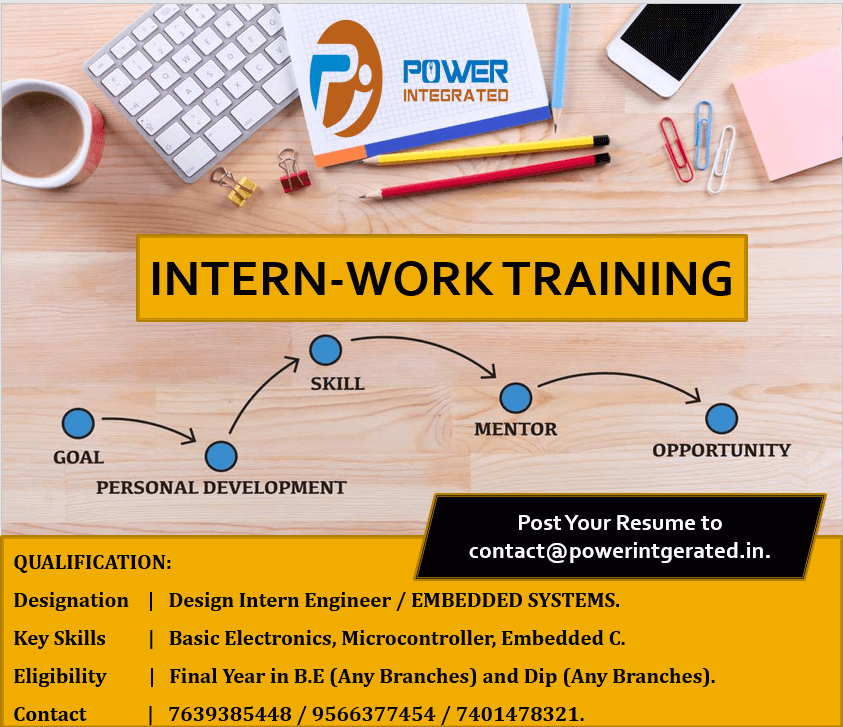INTERN WORK TRAINING IN TRICHY
An internship is a temporary position that provides on-the-job training in a student’s major or career goal. The student generally works in professional settings while being supervised and monitored by practicing professionals.
Internships can be paid or unpaid. Some of them carry academic credit. In most cases, it’s a win-win situation for students and employers.
QUALIFICATION:
Key Skills : Basic Electronics, Micro controller, Embedded C.
Eligibility : Final Year in B.E (Any Branches) and Dip (Any Branches).
Kindly Post Your Resume to contact@powerintgerated.in.
MODE OF INETERNSHIP:
There are many types of internships, offered by a wide variety of companies in various industries, giving businesses the benefit of a young, inexpensive labor pool. In turn, the interns get real-world experience in their field.
There are also cooperative education programs (known as co-ops) that provide students with multiple periods of work in their major or career goal. Typically, the student alternates semesters between full-time classroom study and full-time work experience. Most positions are paid and carry academic credit. By graduation, students can have a year or more experience in their field.
According to data from the National Association of Colleges and Employers (NACE), 56% of college graduates from the class of 2016 said they had some internship experience.
More than 56% of former interns received at least one job offer in their field within nine months of graduation, while only 36.5% of non-interns reported a job offer during the same time frame.
There’s a growing gap in the salary offer for initial jobs with interns and non-interns. In 2011, interns were offered 12.6% more. In 2015, that figure had risen to 20% more.
Students who accept internships may have the opportunity to:
- Making a good impression.
- Building confidence.
- Taking responsibility.
- Learning to adapt.
- Developing new skills.
- Learning to solve complex problems.
- Developing analytical skills.
- Learning to construct arguments.
- Developing good written and oral communication skills.
- Learning good work habits, such as showing up on time and dressing professionally.
- Learning how to handle workplace pressure.
- Navigating workplace relationships.
- Experiencing a company’s culture and learning how day-to-day decisions are made. Building a good resume.
- Getting your foot in the door of a competitive industry.
LIST OF AVAILABLE FIELDS:
EMBEDDED SYSTEMS:
Micro controller is a processor with built-in memory and RAM and is manufactured by Microchip Technology. It is a compact microcomputer designed to monitor operations of embedded systems in mostly vehicles, machines and devices. However, it is used in systems, where it is required to control certain processes, obtain information from external sources and to interpret collected information. All electronic devices that are used for household purposes comprises of micro controllers because in every device there is a need to monitor processes or perform some actions. Students of Electronics & Telecommunication, Instrumentation and Electrical engineering, who wish to work in PIC microcomputer area, can opt for this PIC / ARDUINO / ARM micro controller training. Besides students, even working professionals working on other controller can enrol in the training course to attain proficiency in it. Candidates and professionals are imparted with the skills to work with Programmable Interface Controllers (PIC micro controllers) at both the hardware and software fronts. By undergoing training program candidates meet the embedded system industry requirements, as they learn to programme the electronic circuits to work for different tasks.
RENEWABLE ENERGY AND ITS APPLICATIONS:
Solar is the Latin word for sun—a powerful source of energy that can be used to heat, cool, and light our homes and businesses. That’s because more energy from the sun falls on the earth in one hour than is used by everyone in the world in one year. A variety of technologies convert sunlight to usable energy for buildings. The most commonly used solar technologies for homes and businesses are solar water heating, passive solar design for space heating and cooling, and solar photovoltaics for electricity.Businesses and industry also use these technologies to diversify their energy sources, improve efficiency, and save money. Solar photovoltaic and concentrating solar power technologies are also being used by developers and utilities to produce electricity on a massive scale to power cities and small towns.
PCB DESIGN AND ITS APPLICATIONS:
- Intoduction about Altium Designer.
- Installation about Altium Designer.
- Starting a new project.
- Schematics design.
- Selecting components and creating libraries.
- Footprints, 3D models and starting a new PCB.
- Variants & BOMs.
- Checking Libraries and Schematics
- PCB Layout ( 1st Part ) & Placement.
- PCB Layout ( 2nd Part ) & Impedances, Stackup.
- Stackup (2nd Part), Finishing PCB, Length Matching.
- Generating Output documentation.

